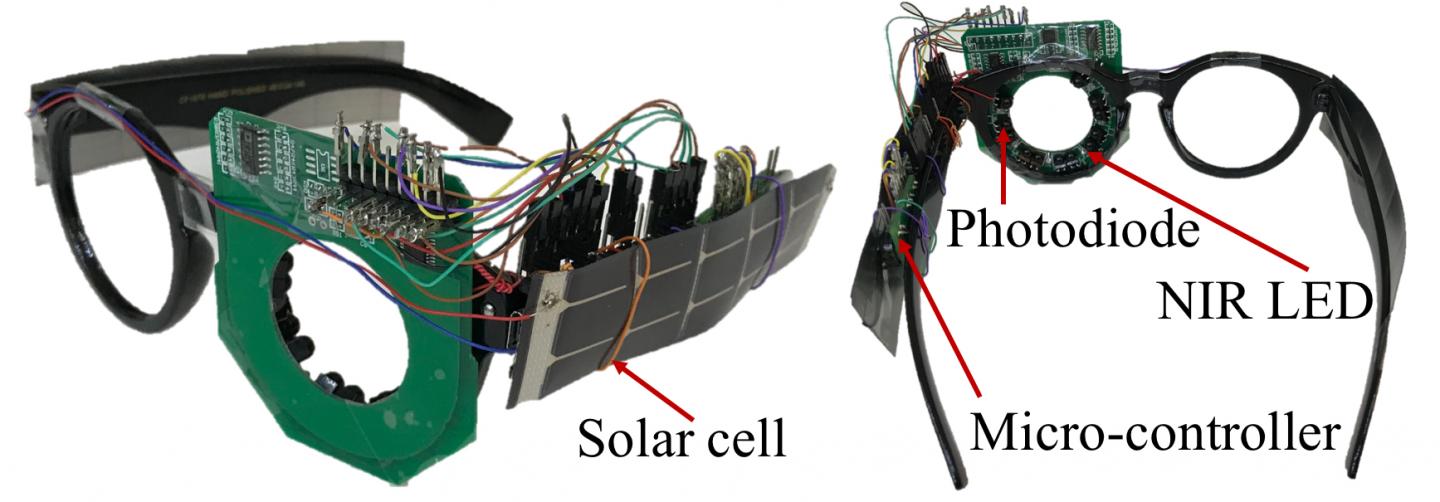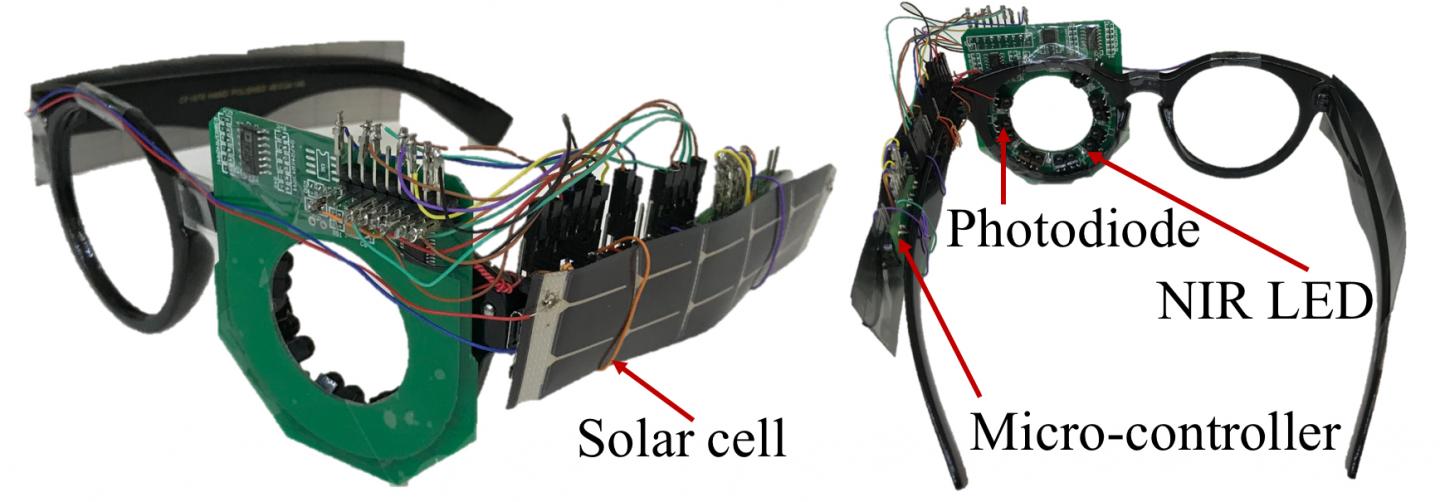
Credit: Photo courtesy of DartNets Lab
HANOVER, N.H. – October 29, 2018 – Battery-free eye-tracking glasses developed at Dartmouth College could create an even more realistic experience for augmented reality enthusiasts. The new technology improves player controls for gaming and allows for more accurate image displays.
High power consumption and cost have kept eye trackers out of current augmented reality systems. By using near-infrared lights and photodiodes, Dartmouth's DartNets Lab has created an energy-efficient, wearable system that tracks rapid eye movements and allows hands-free input of system commands.
The glasses, which can also help monitor human health, are being introduced at MobiCom 2018 taking place from October 29-November 2 in New Delhi, India.
"This is an exciting advancement for gamers, developers and other users of smart glasses," said Xia Zhou, an associate professor of computer science at Dartmouth and project lead, "it's the first-ever eye tracker that can fit into your everyday glasses and run without batteries."
Using the eyes as effective input devices in human-to-computer interaction systems like video games requires precision tracking of rapid eye movements at the sub-millimeter level. Ideal tracking devices should be portable and consume low levels of power to eliminate frequent charging. Up until now, no such system has existed.
According to the Dartmouth research team, existing wearable eye trackers fall short mainly because of the inability to match high tracking performance with low energy consumption. Most trackers use cameras to capture eye images, requiring intensive image processing and resulting in high costs and the need for clunky external battery packs.
"We took a minimalist approach that really pays off in power use and form factor," said Tianxing Li, a PhD student at Dartmouth and author of the research paper. "The new system opens a wide range of uses for eye-tracking applications."
To make the Dartmouth system work, researchers needed to detect the trajectory, velocity, and acceleration of the eye's pupil without cameras. Near-infrared lights are used to illuminate the eye from various directions while photodiodes sense patterns of reflected light. Those reflections are used to infer the pupil's position and diameter in real time through a lightweight algorithm based on supervised learning.
The prototype was built with off-the-shelf hardware components and integrated into a regular pair of glasses that track four stages of eye movement known as fixation, smooth pursuit, saccade and blinking. Experiments showed that the system achieves super high accuracy with low error for pupil tracking.
"By detecting the type of eye movement, the system can adapt sensing and computation. Some movements have predictable trajectories, allowing the system to infer subsequent pupil position and minimizing energy use." said Li.
With power consumption that is hundreds of times lower than current systems, the Dartmouth eye tracker can be powered by energy harvested from indoor lighting, meaning that no batteries are required. The battery-free eye-tracker system is also easier to integrate into a regular pair of glasses.
According to the paper: "Although solar energy harvesting has been studied extensively in the literature, to the best of our knowledge, there have been no systematic measurements with setups similar to ours." The layout of the Dartmouth eye-tracker system is made unique by the placement of solar cells vertically on the side of the arms of the glasses to harvest energy from indoor lighting under various user activities.
The low-cost system can be used for augmented reality game and display systems. By allowing for a more precise measurements of eye position, the system can one day eliminate the need for hand controllers and can result in more efficient rendering of images by display systems, meaning higher quality images.
The study was conducted exclusively indoors because strong infrared light outdoors can saturate light sensors in the current prototype. Future research includes adapting the light sensor gain in the system for outdoor use and improving detection of certain rapid eye movements.
With more advancement, continuous eye tracking can also be used to identify health issues like mental disorders, to detect cognitive states like fatigue, and to assess the effectiveness of clinical treatments. Future models will also be optimized for a more miniaturized look and even better integration into regular glasses with various shapes.
###
Editor's Notes:
The research paper and accompanying video may be found at: https://home.cs.dartmouth.edu/~xia/
About Dartmouth
Founded in 1769, Dartmouth is a member of the Ivy League and offers the world's premier liberal arts education, combining its deep commitment to outstanding undergraduate and graduate teaching with distinguished research and scholarship in the arts and sciences and its three leading professional schools: the Geisel School of Medicine, Thayer School of Engineering and Tuck School of Business.
Media Contact
David Hirsch
[email protected]
@dartmouth
http://www.dartmouth.edu





